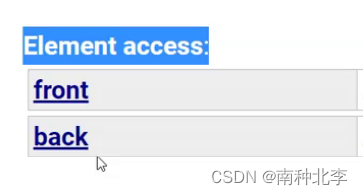- 1mac下安装android studio 遇到问题及解决方案_jetbrains toolbox app无法安装android studio
- 2Doris案例篇—Doris 在思必驰的应用实践
- 3NLP-语义解析(Text2SQL):Text2SQL 数据集
- 4Java学习总结之坦克大战项目(完结版)
- 5Docker - Docker Buildx
- 6鸿蒙ArkTS开发工具安装,环境配置
- 7Python学习笔记(五):数据类型之 String_python rstring
- 8RAM ROM FLASH的区别_rom和flash的区别
- 9xss反射型post_XSS 跨站脚本攻击漏洞详解(反射型xss+储存型xss)
- 10C++练习题(1):开始C++、处理数据、符合类型、循环和关系表达式
C++list_c++ list find
赞
踩
list是个双向链表。

底层是带头双向循环链表。
元素访问没有[]了,意味着以后大部分需要使用迭代器进行访问。
先试着写一下代码。
- #include<list>
- using namespace std;
- void test1()
- {
- list<int> lt;
- lt.push_back(1);
- lt.push_back(2);
- lt.push_back(3);
- lt.push_back(4);
- list<int>::iterator it = lt.begin();
- while(it != lt.end())
- {
- cout << *it << endl;
- it++;
- }
- for (auto c : lt)
- {
- cout << c << endl;
- }
- }
- int main()
- {
- test1();
- return 0;
- }

到着遍历可以用反向迭代器。

const对象调用const迭代器。
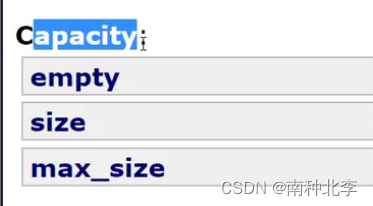
没有reserve和resize了,因为链表是按需要申请和释放空间的。

获取头和尾的数据 。
如果pop_back的数量大于结点数量,会报错。
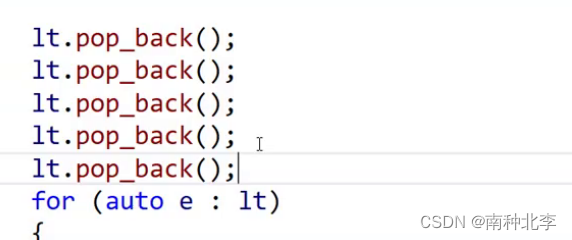

list中没有find()模板,需要调用algorithm库中的find。
- #include<iostream>
- #include<algorithm>
- #include<list>
- using namespace std;
- void test2()
- {
- list<int> lt;
- lt.push_back(1);
- lt.push_back(2);
- lt.push_back(3);
- lt.push_back(4);
- auto pos = find(lt.begin(), lt.end(), 3);
- if (pos != lt.end())
- {
- lt.insert(pos, 30);
- }
- for (auto i : lt)
- {
- cout << i <<" ";
- }
- cout << endl;
- }
- int main()
- {
- test2();
- return 0;
- }

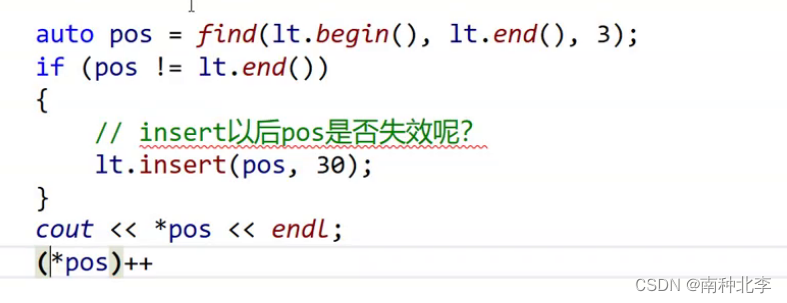
不失效。
但erase后,pos会失效,因为此时pos位置结点已经没了。
底层是快速排序。

链表sort底层是归并排序。
为什么链表有自己的sort?

vector和string属于随机。

底层是快速排序。
![]()
它俩能够相减,需要迭代器是连续的,而链表迭代器不连续。
链表list要排序只能使用list的sort了。
用库里面sort对vector排序要比list中的sort对链表排序快。
 。
。
平时头插和头删最好不用vector 。
remove一个对象中没有的数,不会报错。
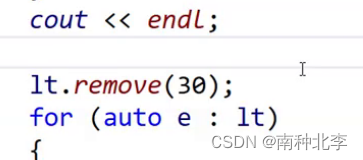
利用unique进行去重,必须先保证链表数据有序。
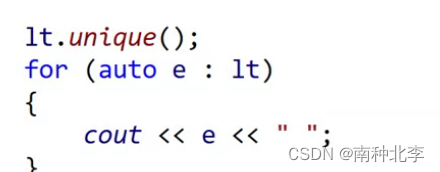
合并

但在合并前,需要保证两个列表数据都是有序的,否则会报错。
- void test3()
- {
- list<int> lt;
- lt.push_back(1);
- lt.push_back(2);
- lt.push_back(3);
- lt.push_back(4);
- lt.push_front(5);
- lt.push_front(6);
-
- for (auto e : lt)
- {
- cout << e << " ";
- }
- cout << endl;
-
- list<int> lt1(lt);
- for (auto e : lt1)
- {
- cout << e << " ";
- }
- cout << endl;
-
- lt.clear();
- for (auto e : lt)
- {
- cout << e << " ";
- }
- cout << endl;
- }

这个代码,我们需要写个深拷贝构造函数,因为默认拷贝构造函数是个浅拷贝,lt被clear后,地址被释放了一次,lt1出函数时,地址又被释放了一次,它俩是相同的地址,被释放两次,所以会报错。
简单模拟实现下list
- #include<iostream>
- #include<string>
- #include<list>
- #include<algorithm>
- #include<assert.h>
-
- namespace bit
- {
- using namespace std;
-
- template<class T>
- struct list_node
- {
- list_node* _next;
- list_node* _prev;
- T _data;
- list_node(const T& x)
- :_next(nullptr)
- , _prev(nullptr)
- , _data(x)
- {}
- };
- template<class T, class Ref>
- struct list_iterator
- {
- typedef list_node<T> node;
- typedef list_iterator<T, Ref> self;
- node* _pnode;
- list_iterator(node* p)
- :_pnode(p)
- {}
- Ref operator*()
- {
- return _pnode->_data;
- }
- self& operator++()
- {
- _pnode = _pnode->_next;
- return *this;
- }
- self& operator--()
- {
- _pnode = _pnode->_prev;
- return *this;
- }
- bool operator!=(const self& e)
- {
- return _pnode != e._pnode;
- }
- };
- template<class T>
- class list
- {
- public:
- typedef list_node<T> node;
- typedef list_iterator<T, T&> iterator;
- typedef list_iterator<T, const T&> const_iterator;
- list()
- {
- empty_initialize();
- }
-
- const_iterator begin()const
- {
- return const_iterator(_head->_next);
- }
- const_iterator end()const
- {
- return const_iterator(_head);
- }
- iterator begin()
- {
- return iterator(_head->_next);
- }
- iterator end()
- {
- return iterator(_head);
- }
- iterator insert(iterator pos, const T& n)
- {
- node* newnode = new node(n);
- node* cur = pos._pnode;
- node* prev = cur->_prev;
- newnode->_next = cur;
- newnode->_prev = prev;
- prev->_next = newnode;
- cur->_prev = newnode;
- return iterator(newnode);
- }
- iterator erase(iterator pos)
- {
- assert(pos != end());
-
- node* prev = pos._pnode->_prev;
- node* next = pos._pnode->_next;
- prev->_next = next;
- next->_prev = prev;
- delete pos._pnode;
-
- return iterator(next);
- }
- list<T>& operator=(const list<T>& lt)
- {
- if (this != <)
- {
- clear();
- for (const auto& e : lt)
- {
- push_back(e);
- }
- }
- return *this;
- }
- void push_front(const T& x)
- {
- insert(begin(), x);
- }
- void pop_front()
- {
- erase(begin());
- }
- void pop_back()
- {
- erase(--end());
- }
- void clear()
- {
- iterator it = begin();
- while (it != end())
- {
- it = erase(it);
- }
- }
- /*list(const list<T>& lt)
- {
- _head = new node(T());
- _head->_next = _head;
- _head->_prev = _head;
- for (const auto &e : lt)
- {
- push_back(e);
- }
- }*/
- void empty_initialize()
- {
- _head = new node(T());
- _head->_next = _head;
- _head->_prev = _head;
- }
- ~list()
- {
- clear();
- delete _head;
- _head = NULL;
- }
- void push_back(const T& e)
- {
- /*node* NEW = new node(e);
- node* tail = _head->_prev;
- tail->_next = NEW;
- NEW->_next = _head;
- _head->_prev = NEW;
- NEW->_prev = tail;*/
- insert(end(), e);
-
- }
-
-
- private:
- node* _head;
- };
- void test1_1(const list<int>& lt1)
- {
- list<int>::const_iterator it1 = lt1.begin();
- cout << "lt1::";
- while (it1 != lt1.end())
- {
- cout << *it1 << " ";
- ++it1;
- }
- cout << endl;
- }
- void test1()
- {
- list<int> lt1;
- lt1.push_back(1);
- lt1.push_back(2);
- lt1.push_back(3);
- lt1.push_back(4);
- lt1.push_back(5);
-
- list<int>::iterator it = lt1.begin();
-
- cout << "lt1:";
- while (it != lt1.end())
- {
- cout << (*it)++ << " ";
- ++it;
- }
- cout << endl;
- cout << "lt1:";
- for (auto e : lt1)
- {
- cout << e;
-
- }
-
- lt1.insert(lt1.end(), 7);
-
- cout << endl;
- cout << "lt1:";
- for (auto e : lt1)
- {
- cout << e;
- }
- cout << endl;
- list<int> lt2 = lt1;
- lt1.erase(--lt1.end());
- lt1.erase(--lt1.end());
- cout << "lt1::";
- for (auto e : lt1)
- {
- cout << e;
- }
- cout << endl;
- cout << "lt2::";
- for (auto e : lt2)
- {
- cout << e;
- }
- cout << endl;
-
- lt2 = lt1;
- cout << "lt1::";
- for (auto e : lt1)
- {
- cout << e;
- }
- cout << endl;
- cout << "lt2::";
- for (auto e : lt2)
- {
- cout << e;
- }
- cout << endl;
- test1_1(lt1);
- lt1.push_front(8);
- cout << "lt1::";
- for (auto e : lt1)
- {
- cout << e;
- }
- cout << endl;
-
- lt1.pop_front();
- cout << "lt1::";
- for (auto e : lt1)
- {
- cout << e;
- }
- cout << endl;
- lt1.pop_back();
- cout << "lt1::";
- for (auto e : lt1)
- {
- cout << e;
- }
- cout << endl;
- lt2.clear();
- cout << "lt2::";
- for (auto e : lt2)
- {
- cout << e;
- }
- cout << endl;
- }
-
- }
- int main()
- {
- bit::test3();
- return 0;
- }



构造函数名和类名相同,list是类名,所以不写list<int>,因为这是个类型。
在类模板内部类型等同于类名,但了解就行,我们尽量不用。
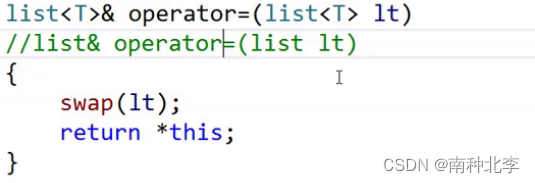
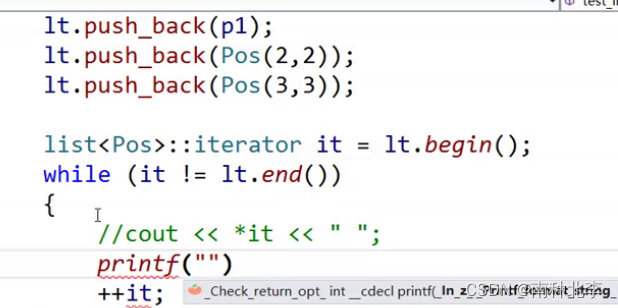
c++中的cout起到了针对自定义类型输出的作用。
因为这个,所以需要提供默认构造。
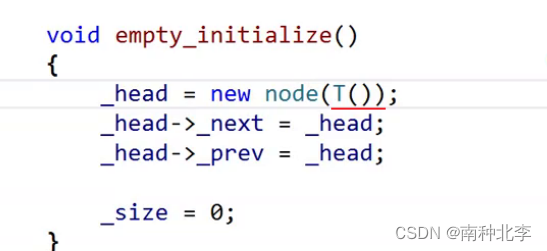
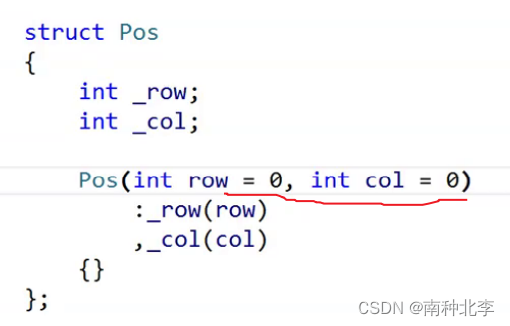
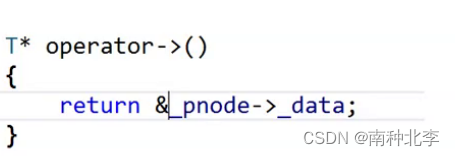
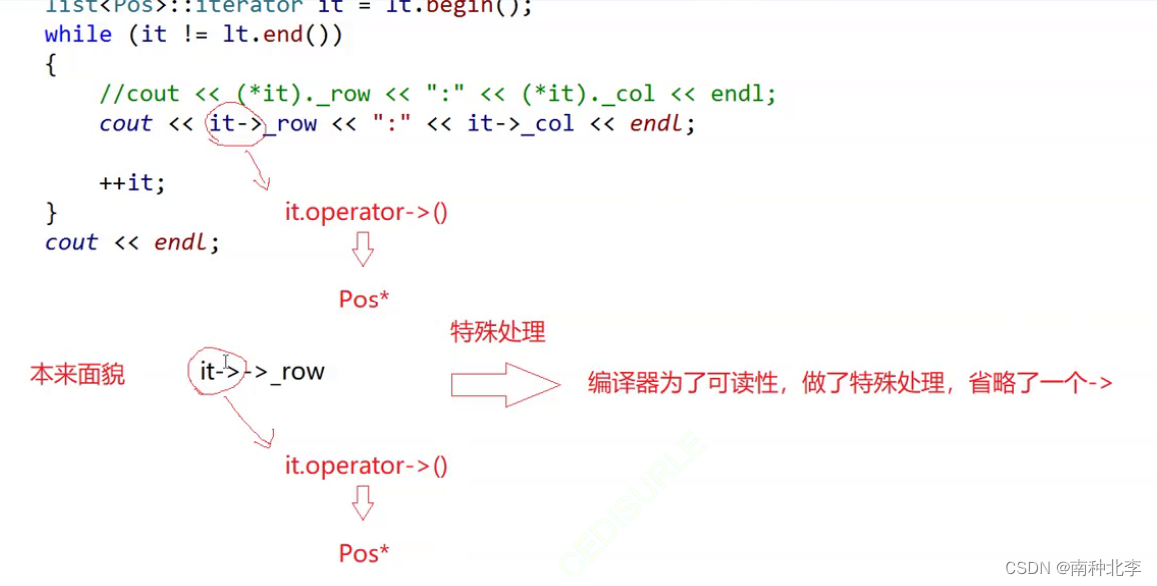
写两个箭头反而是错的。

可以这样写


当我们用const迭代器对数据修改时,发现它可以修改。这就出现了问题。

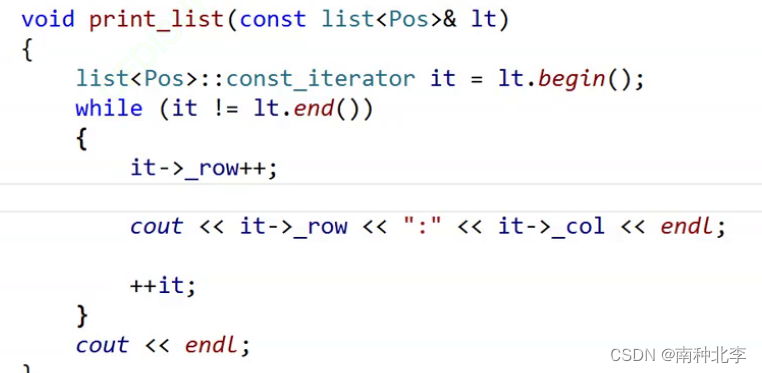
这是因为我们的->运算符重载返回的是T*,我们需要把返回值变为const T*,这样结构体内的数据就不能修改了。
注意T*const,时是指针指向不能修改,而指针指向的结构体中的数据能被修改。

我们再加个模板参数就能解决。

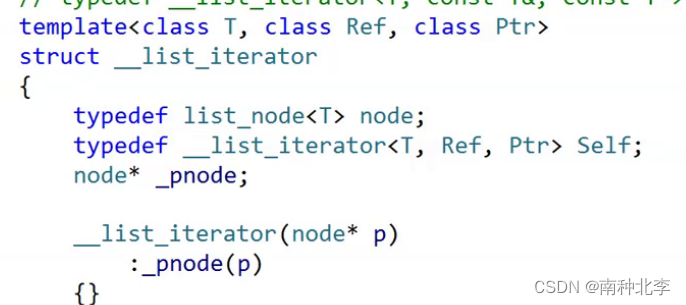

从上述过程,我们也看出了typedef的优势。
来看下完整代码。
- #include<iostream>
- #include<string>
- #include<list>
- #include<algorithm>
- #include<assert.h>
-
- namespace bit
- {
- using namespace std;
-
- template<class T>
- struct list_node
- {
- list_node* _next;
- list_node* _prev;
- T _data;
- list_node(const T& x)
- :_next(nullptr)
- , _prev(nullptr)
- , _data(x)
- {}
- };
- template<class T, class Ref,class Ptr>
- struct list_iterator
- {
- typedef list_node<T> node;
- typedef list_iterator<T, Ref,Ptr> self;
- node* _pnode;
- list_iterator(node* p)
- :_pnode(p)
- {}
- Ref operator*()
- {
- return _pnode->_data;
- }
- self& operator++()
- {
- _pnode = _pnode->_next;
- return *this;
- }
- self& operator++(int)
- {
- self tmp(*this);
- _pnode = _pnode->_next;
- return tmp;
- }
- self& operator--()
- {
- _pnode = _pnode->_prev;
- return *this;
- }
- Ptr operator->()
- {
- return &_pnode->_data;
- }
- bool operator!=(const self& e)
- {
- return _pnode != e._pnode;
- }
- };
- template<class T>
- class list
- {
- public:
- typedef list_node<T> node;
- typedef list_iterator<T, T&,T*> iterator;
- typedef list_iterator<T, const T&,const T*> const_iterator;
- list()
- {
- empty_initialize();
- }
-
- const_iterator begin()const
- {
- return const_iterator(_head->_next);
- }
- const_iterator end()const
- {
- return const_iterator(_head);
- }
- iterator begin()
- {
- return iterator(_head->_next);
- }
- iterator end()
- {
- return iterator(_head);
- }
- iterator insert(iterator pos, const T& n)
- {
- node* newnode = new node(n);
- node* cur = pos._pnode;
- node* prev = cur->_prev;
- newnode->_next = cur;
- newnode->_prev = prev;
- prev->_next = newnode;
- cur->_prev = newnode;
- return iterator(newnode);
- }
- iterator erase(iterator pos)
- {
- assert(pos != end());
-
- node* prev = pos._pnode->_prev;
- node* next = pos._pnode->_next;
- prev->_next = next;
- next->_prev = prev;
- delete pos._pnode;
- pos._pnode;
- return iterator(next);
- }
- /*list<T>& operator=(const list<T>& lt)
- {
- if (this != <)
- {
- clear();
- for (const auto& e : lt)
- {
- push_back(e);
- }
- }
- return *this;
- }*/
- void push_front(const T& x)
- {
- insert(begin(), x);
- }
- void pop_front()
- {
- erase(begin());
- }
- void pop_back()
- {
- erase(--end());
- }
- void clear()
- {
- iterator it = begin();
- while (it != end())
- {
- it = erase(it);
- }
- }
- /*list(const list<T>& lt)
- {
- _head = new node(T());
- _head->_next = _head;
- _head->_prev = _head;
- for (const auto &e : lt)
- {
- push_back(e);
- }
- }*/
- template <class inter>
- list(inter begin, inter end)
- {
- _head = new node(T());
- _head->_next = _head;
- _head->_prev = _head;
- while (begin != end)
- {
- push_back(*begin);
- ++begin;
- }
- }
- void swap(list<T>& tmp)
- {
- std::swap(_head, tmp._head);
- }
- list(const list<T>& lt)
- {
- empty_initialize();
- list<T> tmp(lt.begin(), lt.end());
- swap(tmp);
- }
- list<T> operator=(list<T> lt)
- {
- swap(lt);
- return *this;
- }
- void empty_initialize()
- {
- _head = new node(T());
- _head->_next = _head;
- _head->_prev = _head;
- }
- ~list()
- {
- clear();
- delete _head;
- _head = NULL;
- }
- void push_back(const T& e)
- {
- /*node* NEW = new node(e);
- node* tail = _head->_prev;
- tail->_next = NEW;
- NEW->_next = _head;
- _head->_prev = NEW;
- NEW->_prev = tail;*/
- insert(end(), e);
-
- }
-
-
- private:
- node* _head;
- };
- struct Pos
- {
-
- Pos(int row = 0, int col = 0)
- :row(row)
- , col(col)
- {}
- int row;
- int col;
- };
- void test1_2(const list<Pos>& lt1)
- {
- list<Pos>::const_iterator it1 = lt1.begin();
- cout << "lt1::";
- while (it1 != lt1.end())
- {
- cout << it1->row << ":" << (*it1).col;
- cout << endl;
- ++it1;
- }
-
- }
- void testpos()
- {
- list<Pos> p1;
- p1.push_back(Pos(1, 1));
- p1.push_back(Pos(2, 2));
- p1.push_back(Pos(3, 3));
- p1.push_back(Pos(4, 4));
- list<Pos>::iterator it = p1.begin();
- while (it != p1.end())
- {
- //cout << (*it).row << ":" << (*it).col;
- cout << it->row << ":" << (*it).col;
-
- cout << endl;
- ++it;
- }
- test1_2(p1);
- }
-
-
-
- }
- int main()
- {
- bit::testpos();
- return 0;
- }

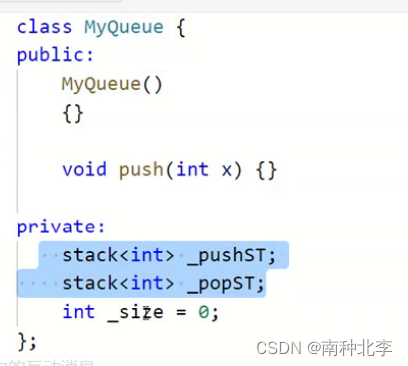
初始化列表如果不显示初始化, 自定义类型会调用默认构造函数,内置类型需要自己给缺省值,或在初始化列表显示初始化,否则会被初始化为随机值。
对于析构而言,编译器对自定义类型调用析构函数,对于内置类型不处理。编译器也不敢处理。
比如list的头指针。因为list它不仅有头结点。只处理头结点会出错。
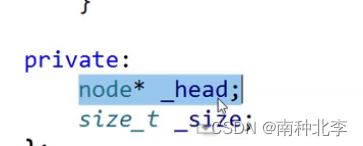
迭代器我们没有写析构函数,_pnode也不会自动释放。
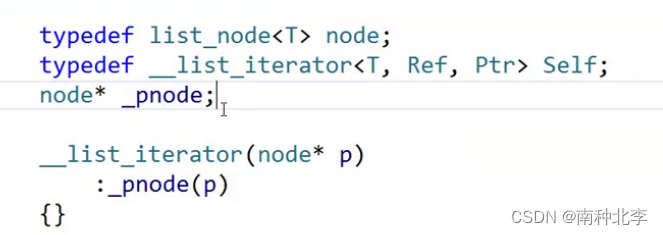

另外之前我们自己模拟实现的迭代器的拷贝构造 其实是浅拷贝。
两个容器指向同一个空间。因为_pnode并不释放,所以浅拷贝不会出问题。
不需要显示写析构,就不需要显示写拷贝构造和赋值。


